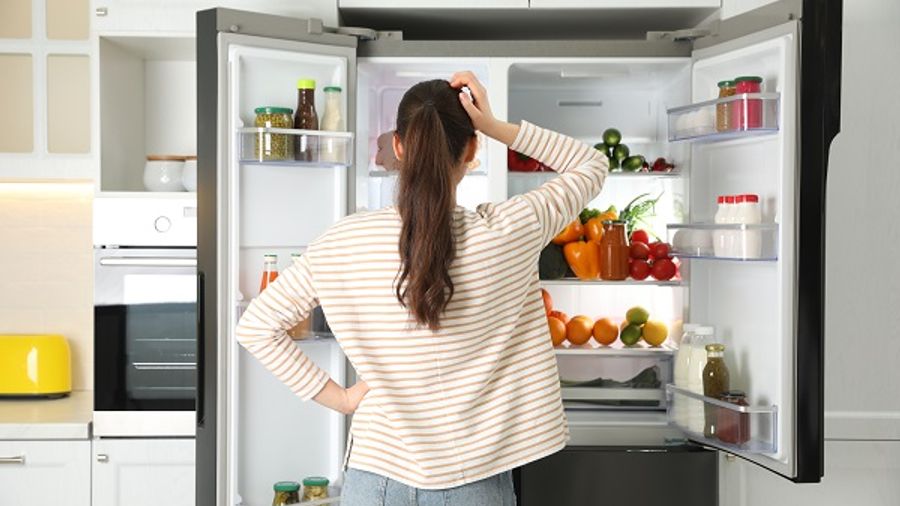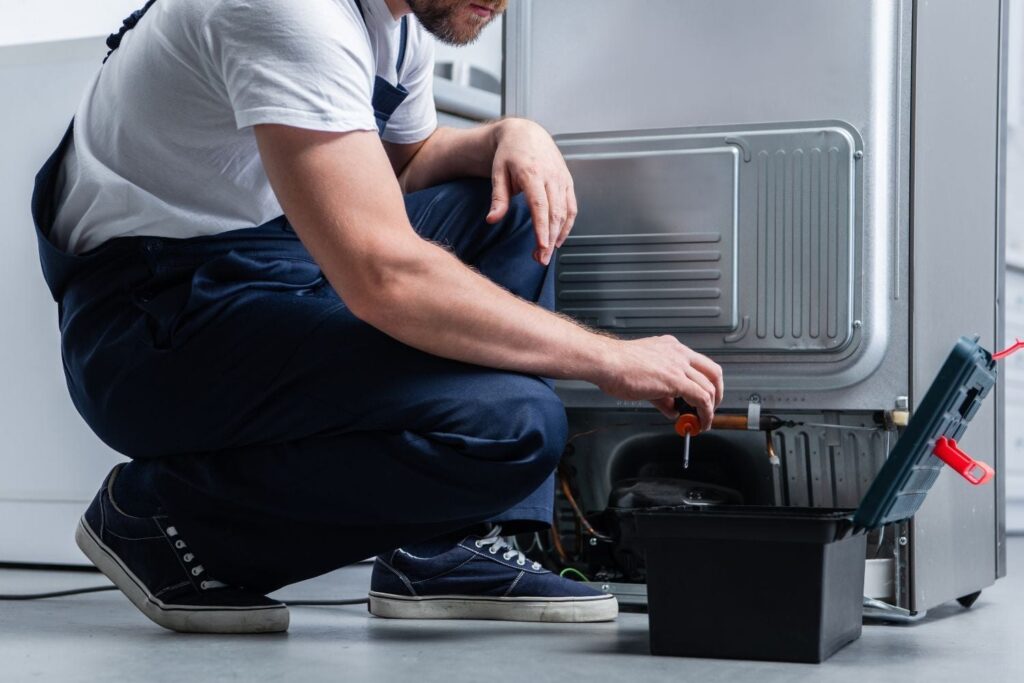The refrigerator is one of the most essential appliances in every home, keeping food fresh and beverages chilled. However, like any machine, it’s prone to problems over time. These issues can be frustrating, especially when they disrupt your daily routine. The good news is that many refrigerator problems can be resolved with basic troubleshooting or minor repairs.
In this blog, we’ll dive into 5 common refrigerator issues and provide actionable solutions to fix them. Let’s keep your refrigerator running smoothly and efficiently!

1. Refrigerator Not Cooling Properly
A refrigerator that isn’t cooling properly can lead to spoiled food and beverages. This is one of the most common problems homeowners face.
Possible Causes:
- Dirty Condenser Coils: Dust and debris can clog the condenser coils, reducing cooling efficiency.
- Faulty Thermostat: A broken thermostat might prevent the refrigerator from maintaining the correct temperature.
- Damaged Door Seal: If the door seal is loose or cracked, cold air may escape.
How to Fix It:
- Clean the Condenser Coils:
- Turn off the refrigerator and unplug it.
- Locate the coils (usually at the back or bottom) and clean them with a vacuum or coil brush.
- Check the Thermostat:
- Adjust the thermostat to the recommended setting (typically between 37°F and 40°F).
- If it still doesn’t work, consider replacing the thermostat.
- Inspect and Replace Door Seals:
- Close the refrigerator door on a piece of paper. If you can easily pull it out, the seal is faulty.
- Replace the gasket to prevent air leaks.
2. Refrigerator Leaking Water
Water leaks can cause a mess and indicate an underlying problem with your refrigerator.
Possible Causes:
- Clogged or Frozen Defrost Drain: The defrost drain may get clogged with food particles or ice, leading to water overflow.
- Blocked Water Line: For refrigerators with water dispensers, a blocked water line might cause leakage.
How to Fix It:
- Unclog the Defrost Drain:
- Locate the defrost drain (usually at the back of the freezer compartment).
- Use warm water or a pipe cleaner to remove debris or ice.
- Inspect the Water Line:
- Turn off the water supply to the refrigerator.
- Check the water line for kinks or blockages and clean or replace it if necessary.
Pro Tip:
Regularly clean the defrost drain to prevent future clogs.
3. Excessive Noise Coming from the Refrigerator
While refrigerators aren’t silent, unusual noises can be a sign of trouble.
Possible Causes:
- Faulty Fan Motor: The evaporator or condenser fan motor might be damaged.
- Obstructed Fan Blades: Debris can block the fan blades, causing loud noises.
- Loose Components: Loose parts like screws or panels can vibrate and create noise.
How to Fix It:
- Inspect the Fans:
- Locate the evaporator and condenser fans.
- Clean the blades and ensure they’re not obstructed.
- Replace the fan motor if it’s damaged.
- Tighten Loose Parts:
- Check the screws and panels around the refrigerator and tighten them securely.
When to Call a Professional:
If the noise persists, it might be due to compressor issues, which require expert repair.
4. Ice Maker Not Working
For refrigerators with built-in ice makers, a malfunction can be particularly frustrating.
Possible Causes:
- Clogged Water Filter: A dirty water filter can restrict water flow to the ice maker.
- Frozen Water Line: Ice buildup in the water line can prevent water from reaching the ice maker.
- Defective Ice Maker Assembly: The ice maker unit itself might be faulty.
How to Fix It:
- Replace the Water Filter:
- Locate the filter and replace it with a new one every 6 months (or as recommended by the manufacturer).
- Defrost the Water Line:
- Turn off the refrigerator and allow the water line to thaw.
- Use warm water or a hairdryer to speed up the process.
- Inspect the Ice Maker Assembly:
- Check for visible damage to the unit.
- If needed, replace the ice maker assembly.
Pro Tip:
Regularly replace the water filter to ensure clean ice and prevent clogs.
5. Refrigerator Runs Constantly
If your refrigerator seems to run non-stop, it can lead to higher energy bills and indicate an underlying problem.
Possible Causes:
- Dirty Condenser Coils: When coils are dirty, the refrigerator works harder to maintain the temperature.
- Incorrect Temperature Settings: The thermostat might be set too low.
- Door Not Closing Properly: A misaligned or damaged door can cause cold air to escape, forcing the motor to run continuously.
How to Fix It:
- Clean the Condenser Coils:
- Follow the same steps mentioned in issue #1.
- Check the Temperature Settings:
- Set the thermostat to the recommended range (37°F to 40°F).
- Avoid setting it too low unnecessarily.
- Inspect the Door:
- Check the door alignment and seal.
- Adjust the hinges or replace the gasket if necessary.
Preventive Maintenance Tips for Refrigerators
Preventing issues before they arise can save you time, money, and frustration.
- Regular Cleaning: Clean the interior, shelves, and coils every 3-6 months.
- Check Door Seals: Inspect seals periodically and replace them if they show signs of wear.
- Avoid Overloading: Do not overcrowd the refrigerator, as it can restrict airflow.
- Allow Proper Ventilation: Ensure there’s adequate space around the refrigerator for airflow.
When to Call a Professional
While many refrigerator problems can be fixed with DIY methods, some issues require professional expertise:
- Compressor failure.
- Gas leaks.
- Persistent cooling issues after troubleshooting.
At Quick Fix Home Repairs, our team of experts is equipped to handle all types of refrigerator problems, ensuring quick and reliable solutions.
Why Timely Repairs Matter
Ignoring refrigerator problems can:
- Lead to spoiled food.
- Increase energy consumption.
- Cause bigger, more expensive issues in the long run.
By addressing these common issues promptly, you can extend your refrigerator’s lifespan and keep it running efficiently.

Conclusion
Your refrigerator works tirelessly to keep your food fresh, but it needs regular care and attention to perform its best. By understanding these 5 common issues and how to fix them, you can save yourself time, money, and frustration.
If you’re facing a problem that seems too complex to handle, don’t hesitate to contact Quick Fix Home Repairs. Our skilled technicians are here to help you restore your refrigerator to perfect working order.
